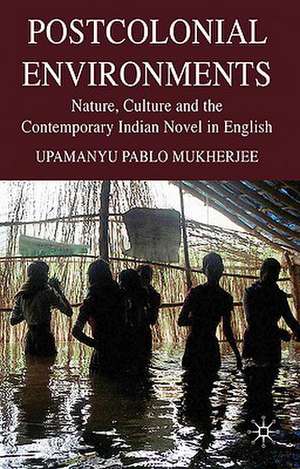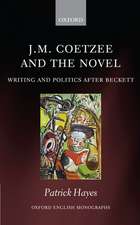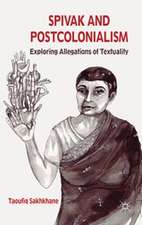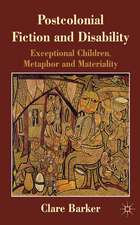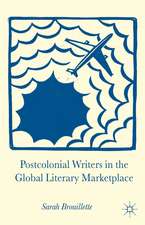Postcolonial Environments: Nature, Culture and the Contemporary Indian Novel in English
Autor U. Mukherjeeen Limba Engleză Hardback – 20 ian 2010
Preț: 694.87 lei
Preț vechi: 817.50 lei
-15% Nou
Puncte Express: 1042
Preț estimativ în valută:
132.97€ • 139.18$ • 110.67£
132.97€ • 139.18$ • 110.67£
Carte tipărită la comandă
Livrare economică 31 martie-14 aprilie
Preluare comenzi: 021 569.72.76
Specificații
ISBN-13: 9780230219373
ISBN-10: 0230219373
Pagini: 203
Ilustrații: VIII, 203 p.
Dimensiuni: 140 x 216 x 18 mm
Greutate: 0.36 kg
Ediția:2010
Editura: Palgrave Macmillan UK
Colecția Palgrave Macmillan
Locul publicării:London, United Kingdom
ISBN-10: 0230219373
Pagini: 203
Ilustrații: VIII, 203 p.
Dimensiuni: 140 x 216 x 18 mm
Greutate: 0.36 kg
Ediția:2010
Editura: Palgrave Macmillan UK
Colecția Palgrave Macmillan
Locul publicării:London, United Kingdom
Cuprins
Acknowledgements Introduction From Earth Day to Earth Summits 'Green Postcolonialism' and 'Postcolonial Green' Towards Eco-Materialism The River and the Dance: Arundhati Roy Water/Land: Amitav Ghosh Dead Air: Indra Sinha 'Blood on my water': Ruchir Joshi Endnotes References Index
Recenzii
'Postcolonial Environments makes a valuable contribution both to the emerging field of postcolonial ecocriticism and to the established field of Indian English literature, the two main fields combined in Mukherjee's timely and informative book.'
- Graham Huggan, Professor of Commonwealth and Postcolonial Literatures, Leeds University, UK
'Pablo Mukherjee's Postcolonial Environments is an innovative and timely book which builds a critical genealogy of the rapidly expanding field of postcolonial ecocriticism and suggests new directions for the future.
As the first book to place South Asian literature in a dialogue with postcolonial ecocriticism, Mukherjee makes a powerful and convincing argument for a historical materialist method which he terms 'eco-materialist aesthetics.' This is a compelling model of how to approach the unity of humans and nature, the mediating function of labor, and how the materiality of the environment enables our cultural activity. Building upon Marx's ideas on how labor connects humans to the environment and how capitalism enables nature's destruction, Mukherjee's work provides a piercing critique of how forms of empire, past and present, reflect a 'state of permanent war on the global environment' His exploration of the uneven spatial and cultural development of postcolonial experience leads to a perceptive ability to focus on the stylistic and formal innovations within texts that speak more accurately to an adaptive model of 'eco-materialism.' This is a groundbreaking and original book, one that is destined to change the way we speak of the material history and representation of postcolonial environments.'
- Elizabeth deLoughrey, Associate Professor of English, University of California, Los Angeles, USA
'Postcolonial ecocriticism (or ecocritical postcolonialism) is a robust, vibrant and important field to which Mukherjee's volume in a valuable contribution.' - John Miller, Green Letters
- Graham Huggan, Professor of Commonwealth and Postcolonial Literatures, Leeds University, UK
'Pablo Mukherjee's Postcolonial Environments is an innovative and timely book which builds a critical genealogy of the rapidly expanding field of postcolonial ecocriticism and suggests new directions for the future.
As the first book to place South Asian literature in a dialogue with postcolonial ecocriticism, Mukherjee makes a powerful and convincing argument for a historical materialist method which he terms 'eco-materialist aesthetics.' This is a compelling model of how to approach the unity of humans and nature, the mediating function of labor, and how the materiality of the environment enables our cultural activity. Building upon Marx's ideas on how labor connects humans to the environment and how capitalism enables nature's destruction, Mukherjee's work provides a piercing critique of how forms of empire, past and present, reflect a 'state of permanent war on the global environment' His exploration of the uneven spatial and cultural development of postcolonial experience leads to a perceptive ability to focus on the stylistic and formal innovations within texts that speak more accurately to an adaptive model of 'eco-materialism.' This is a groundbreaking and original book, one that is destined to change the way we speak of the material history and representation of postcolonial environments.'
- Elizabeth deLoughrey, Associate Professor of English, University of California, Los Angeles, USA
'Postcolonial ecocriticism (or ecocritical postcolonialism) is a robust, vibrant and important field to which Mukherjee's volume in a valuable contribution.' - John Miller, Green Letters
Notă biografică
UPAMANYU PABLO MUKHERJEE was born in Calcutta, India, and educated there. He won a Rhodes Scholarship to study in Oxford, UK, and went on to teach at Cambridge, Newcastle and Warwick Universities. He is the author of Crime Fiction and Empire (2005).
